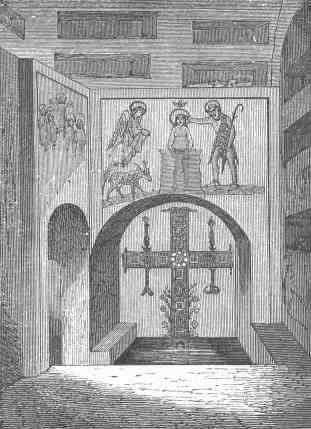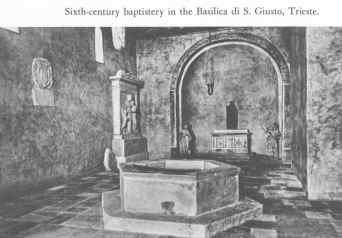Death to sin, living in Christ as represented by baptism 1
Refuse sin in your bodies because you died to sin 8
Freedom from sin, slavery to God 15
| Text | Comments | |
| Ch.5,v.20
Moreover the law entered, that the offence might abound. But where sin
abounded, grace did much more abound:
21 That as sin hath reigned unto death, even so might grace reign through righteousness unto eternal life by Jesus Christ our Lord. .1 ¶ What shall we say then? Shall we continue in sin, that grace may abound? 2 God forbid. How shall we, that are dead to sin, live any longer therein? .3 Know ye not, that so many of us as were baptized into Jesus Christ were baptized into his death? .4 Therefore we are buried with him by baptism into death: that like as Christ was raised up from the dead by the glory of the Father, even so we also should walk in newness of life. 5 For if we have been planted together in the likeness of his death, we shall be also in the likeness of his resurrection: .6 Knowing this, that our old man is crucified with him, that the body of sin might be destroyed, that henceforth we should not serve sin. 7 For he that is dead is freed from sin. |
1
- Continue in sin? Grace is the provision for escaping sin
according to the law. Paul argues that it cannot be a reason for excusing
sin. Also v.15.
3 - Baptized The argument continues. In Paul's illustration, we see two important principles: Baptism is being buried in the water as Christ was buried in the tomb. Sprinkling and pouring came into the church without Scriptural support. In fact, "holy water" was adopted from pagan worship. Sprinkling was approved by the Roman church at the council of Ravenna in 1311.
Many who love the Lord and are living in a saving relationship with Him are unaware of this history. 4 - Buried with him The phrase is clear. Also see how Philip baptized the Ethiopian ac0836ff. |
|
.8
Now if we be dead with Christ, we believe that we shall also live with
him:
 .9
Knowing that Christ being raised from the dead dieth no more; death hath
no more dominion over him. .9
Knowing that Christ being raised from the dead dieth no more; death hath
no more dominion over him.
.10 For in that he died, he died unto sin once: but in that he liveth, he liveth unto God. .11 Likewise reckon ye also yourselves to be dead indeed unto sin, but alive unto God through Jesus Christ our Lord. .12 Let not sin therefore reign in your mortal body, that ye should obey it in the lusts thereof. 13 Neither yield ye your members as instruments of unrighteousness unto sin: but yield yourselves unto God, as those that are alive from the dead, and your members as instruments of righteousness unto God. .14 For sin shall not have dominion over you: for ye are not under the law, but under grace. The illustration shows the baptistery in the Catacomb of San Ponziano, Rome. The practice of baptism by immersion was gradually replaced by the more-convenient pouring or sprinkling without biblical authority. For more on baptism go to the Matt. 28 notes page. 11 - Reckon ... yourselves to be dead to sin This is more than pretending that we are okay. See the next verse. 12 - Let not sin From the context, we see that Paul says, "Death to sin means you won't allow sin to be your master." 13 - Members [body parts] as instruments of unrighteousness We should refuse to permit our eyes to look at things that would draw us into sin. Our feet should not take us to the wrong places. Even private members must not be used contrary to the glory of God mt0530. 14 - Sin ... not dominion Confirming v12. 14 - Not under the law but under grace This verse is often misunderstood. What is being under grace in the context? It is accepting God's grace to have victory over sin (refusing to grant it dominion or control). Then what is being under the law? We are under the law when we permit sin to control us because then the law condemns us ro0801. Paul connects this with looking to obedience to the law for salvation. This was a major problem of Jews and others in his day. |
||
 |
||
| .15
What then? shall we sin, because we are not under the law, but under grace?
God forbid.
.16 Know ye not, that to whom ye yield yourselves servants to obey, his servants ye are to whom ye obey; whether of sin unto death, or of obedience unto righteousness? 17 But God be thanked, that ye were the servants of sin, but ye have obeyed from the heart that form of doctrine which was delivered you. .18 Being then made free from sin, ye became the servants of righteousness. 19 I speak after the manner of men because of the infirmity of your flesh: for as ye have yielded your members servants to uncleanness and to iniquity unto iniquity; even so now yield your members servants to righteousness unto holiness. |
15
- Shall we sin? Paul is addressing those whom he assumes
are dead to sin as represented by baptism v4, v8.
He may have feared that some would take his words as license to sin. He
clarified in the next verse.
16 - Yield yourselves servants to obey What are the choices? Sin or righteousness (servants of righteousness is clarified in v18). 16 - Obedience unto righteousness Obedience to what? To the law that, in the previous verse, we are not under. If we choose the other master, sin, we are no longer dead to sin v11. We are then under the law which condemns our sin. 18 - Free from sin This is the condition Paul assumes his readers are taking. They are thus not under the law. This freedom was represented by the exodus from Egypt r12t. 18 - Servants From douloo so the word is literally "slaves." God does not keep us in bondage but we may choose to be wholly committed to Him. In fact only in accepting Him and rejecting every form of sin, may we find salvation. mt2236. |
|
| .20
For when ye were the servants of sin, ye were free from righteousness.
21 What fruit had ye then in those things whereof ye are now ashamed? for the end of those things is death. .22 But now being made free from sin, and become servants to God, ye have your fruit unto holiness, and the end everlasting life. 22 But now that you have been set free from sin and have become slaves of God, the return you get is sanctification and its end, eternal life. (RSV) .23 For the wages of sin is death; but the gift of God is eternal life through Jesus Christ our Lord. |
20
- Servants of sin Literally "slaves to sin." The opposite
of v18.
23 - For the wages ... but the gift Here is the choice of fruit described in verses 21 and 22. We earn death but we can't earn life. Praise God for this gift. 23 - Death Not eternal life in hell. See on jn0316. |
|
|
|
|
|
|
|